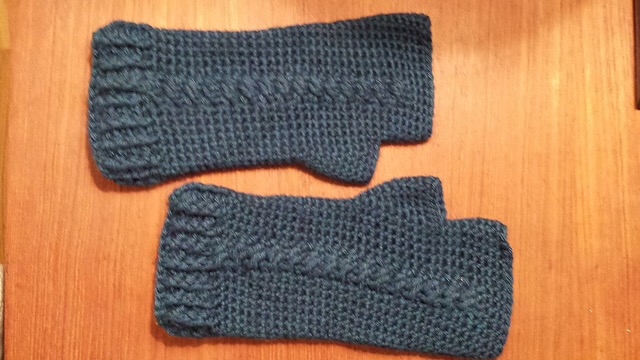Confession – I like to read Dear Prudence on Slate. On Friday I was reading the latest Dear Prudence and felt a crafter’s sense of indignation over the woman who complained her daughter-in-law was “improper and stingy” for giving her a blanket she’s made from materials purchased with a gift card given by said mother-in-law. Apparently lots of other people were also upset. I am happy to report that Prudence answered appropriately (if without a crafter’s rage and indignation): “You received a thoughtful gift that cost more time than money.”
People are, I think, rightfully upset with the gift recipient – she’s not upset that she doesn’t like the blanket, but instead with her perceived stingyness that the materials were in effect paid for by herself while missing out on the amount of work (not to mention, most likely, love) which went into transforming those materials.
After my initial feelings of anger though, my thoughts turned towards the daughter-in-law. I don’t know if she’s aware of her mother-in-law’s letter, but the letter makes it clear that she IS aware of her mother-in-law’s chilly reception of the blanket. I do know how devestating it can be for a crafter to put so much time, energy and care into something that’s then not appreciated. I think any of us who have given craft gifts have run into it, and we all find ourselves having to establish the guidelines for gift giving that work for us.
So, as we enter the gift giving season, I thought I’d share a few things I keep in mind when giving gifts as well as an example of why I think it can be worth taking a risk and giving a hand made gift even when you aren’t sure about it.
1) Would they want the gift?
Really, this is the same rule as with any gift. If they don’t wear hats, it doesn’t matter how amazing, warm, or full of love my hand knitted hat will be. Hand made thing are special, but they do not actually transform the very purpose and utility of objects. A hat is still something that goes on your head. You are unlikely to transform a non-hat wearer into a hat-wearer.
This leads to similar risks as with all gifts. I may not be sure what somebody will like. Example: I wanted to make a gift for my uncle who lived in norther Michigan. I knew he only wears baseball caps. Thus, making a hat is unlikely to be a great choice. Furthermore, I knew he couldn’t wear a scarf, so that’s out. I settled on fingerless mitts since while I couldn’t be sure he would want them, I had no reason to believe he wouldn’t.
2) Do they merit the time I’m putting into it?
Having decided what somebody would like, should I spend the time making it? For me, this is really a two part question. The answer to both parts doesn’t need to be a resounding “yes”, but together make up whether or not it’s worth my time.
2a) Do they deserve the gift?
This is about my perspective. Why am I giving them a gift? Do I think they merit something of this value (materials + time)? With the example of the blanket and mother-in-law above, in retrospect the answer is clearly “no”. Whether or not she enjoys blankets (and maybe she loves blankets!) her attitude towards how she values gifts shows she’s not worthy.
With regards to my example of fingerless mitts for my uncle – I had no doubt he deserved them and more. At the time he was the only one who could get certain things done for our family, and he more than deserved some indication it was seen and appreciated.
2b) Will they fully appreciate it?
This gets to the recipient’s perspective. Do they understand what it takes to make something by hand? Sometimes, I really don’t know the answer to this until after the gift is given. Sometimes I know for sure. My favorite example of the former was giving a knitted baby sweater to soon-to-be first time parents, and the future father looked at it, pointed at a stitch and said with awe “you made each of these?” Until that moment, I had no idea if they would understand it was handmade, or see it as just another cute baby item.
Again, looking at the example with my uncle, I knew he valued work done by hand since he’d made things for us, like an amazingly detailed bird feeder for my sister, and that he had grown up among women who sewed and crocheted. I couldn’t be sure if he liked hand made garments, but he’d have some idea what went into it.
3) How upset will I be if I incorrectly judged any of the above?
If the answer is “devastated” or “this will destroy our friendship” I’d personally recommend steering clear. We each have different things that upset us most. If you have limited time for crafting, maybe it’s the “appreciate it” piece that’s most important. If it’s really important that the things you make get worn, then it’s important to give it to somebody who will wear it.
I know I’ve misjudged what to give somebody by missing the mark on any one of the questions about. My most common combos are: “they deserve it, they appreciate it, but it wasn’t the right type of garment” and “they deserve it, they don’t really appreciate it, and it was kinda the right type of garment”. If I’ve screwed up (and unless the recipient responds in a socially inappropriate way – see initial example – I am the only one who screwed up) I think twice before making something for that person again.
3b) How important is to to me to KNOW if I’ve successfully judged all of the above?
This one is really hard for many people. There are regular Ravelry threads on the topic of missing thank you cards and lack of huge displays of appreciation. I love hearing that a gift is being used, or seeing my socks on the recipients feet the next time I see them. I’ll probably take it as a hint if somebody who always writes thank you cards goes silent.
But some folks are bad at that. Like small children (always a total crap shoot what they’ll like) and, well, my uncle (which I kinda knew). The first confirmation I received that he even got his crocheted fingerless mitts was two months after I mailed them when my dad reported seeing them while visiting my uncle (I took this as a good sign – they were being worn).
When he passed away suddenly only a few months after that, I realized that what was most important to me was knowing I’d found the time I had to make something (however small) that year because he deserved it. And I was glad I hadn’t waited to find something “perfect”. I also assumed I would just never know what he thought.
On my next visit to my aunt, she told me how much he’d enjoyed them. He worked as a postman, and wore them to deliver mail, showing off the mitts his neice made to anybody near their mailbox.

